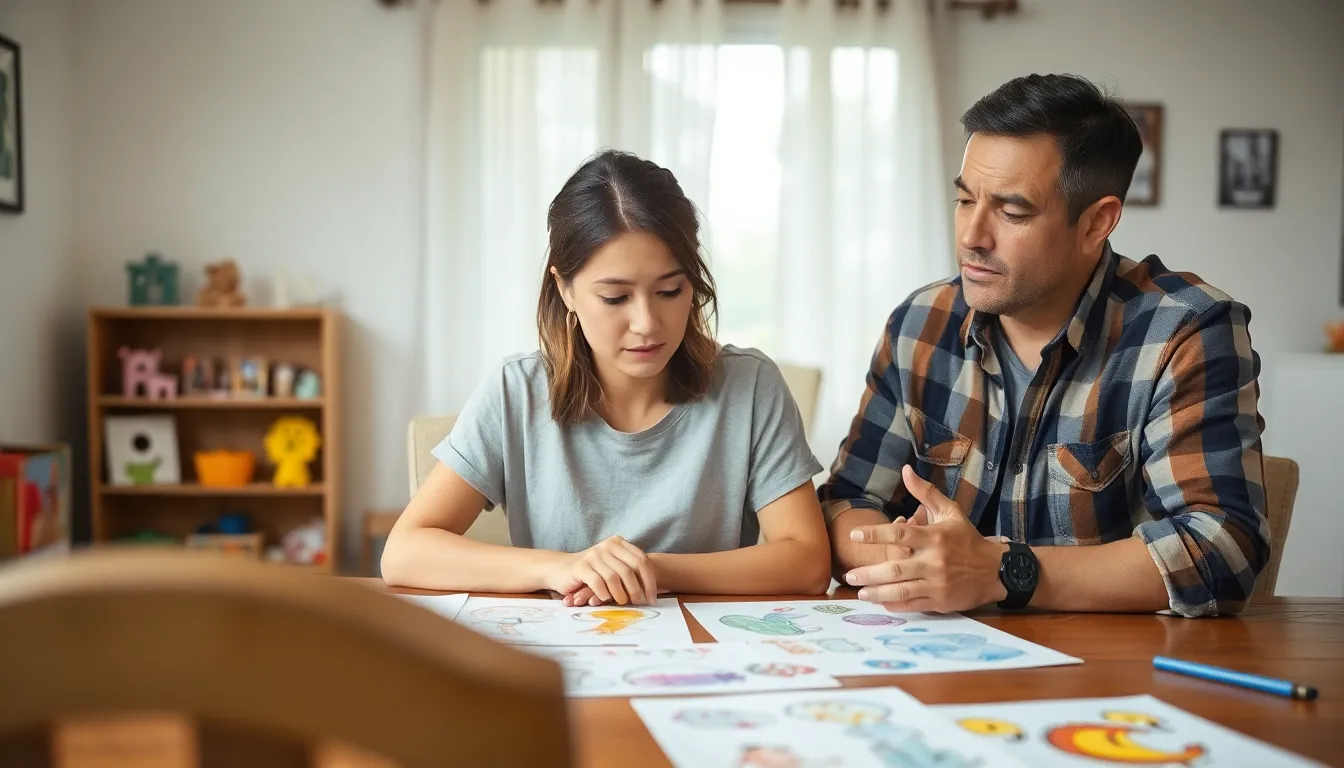Navigating the wild world of parenting after separation can feel like trying to assemble IKEA furniture without the instructions—confusing and a bit frustrating. Suddenly, parents find themselves juggling schedules, emotions, and the occasional tantrum, all while trying to maintain their sanity. But fear not! This journey, though challenging, can also be filled with unexpected laughter and growth.
In this new chapter, parents can discover creative ways to co-parent effectively while keeping the peace. It’s not just about surviving; it’s about thriving. With a sprinkle of humor and a dash of understanding, they can turn what seems like a chaotic circus into a well-orchestrated show. Buckle up for tips and insights that’ll help transform the post-separation parenting experience into a rewarding adventure that benefits everyone involved.
Table of Contents
ToggleUnderstanding Parenting After Separation
Navigating parenting after separation presents unique challenges. Parents face emotional struggles and behavioral adjustments.
The Emotional Impact on Parents
Parents often experience feelings of loss and grief after separation. Being away from a former partner can lead to feelings of loneliness. Concerns about financial stability also weigh heavily during this time. Managing co-parenting arrangements introduces additional stressors. Parents may encounter challenges in communication, which can escalate conflicts. Ignoring self-care can further compound stress. Seeking support networks, therapy, or counseling serves as a crucial step towards healing. Prioritizing mental health positively impacts the overall family dynamic.
The Emotional Impact on Children
Children frequently feel confused and anxious after their parents’ separation. Changes in their routines can lead to feelings of instability. They may express sadness or anger, often through behavioral issues. Seeking reassurance about love and stability proves essential during this transition. Open communication offers children a way to voice their feelings. Consistent routines provide comfort and a sense of security for them. Encouraging healthy coping strategies helps children adjust effectively. Presenting a united front can greatly reduce anxiety during this challenging time.
Establishing Effective Co-Parenting Strategies

Effective co-parenting relies on clear communication and structured planning, ensuring that all parties maintain stability for the children’s benefit. Strategies enhance understanding and cooperation in the parenting journey.
Communication Tips for Co-Parents
Prioritize regular conversations to establish mutual understanding. Utilize daily check-ins via phone calls, texts, or apps to keep each other updated on children’s activities and schedules. Discuss significant decisions together, fostering a sense of partnership. Show respect by listening actively and validating each other’s feelings. Set specific times to tackle important topics, reducing stress and avoiding conflicts. Use “I” statements to express feelings without assigning blame. Stay focused on solutions, steering clear of past grievances that could trigger emotional responses. Clarity in words encourages a harmonious environment for the children, easing their anxieties.
Creating a Parenting Plan
Structure a comprehensive parenting plan to outline responsibilities and expectations concretely. Start with essential details like living arrangements and visitation schedules, ensuring consistency for the children. Include communication methods about children’s needs and activities, promoting transparent dialogue. Designate decision-making authority concerning education, health, and extracurricular activities, allowing both parents to stay engaged. Anticipate challenges, addressing potential conflicts with solutions in the plan. Update the document as circumstances change, ensuring it remains relevant. A well-thought-out plan cultivates stability, creating a more supportive atmosphere for the children’s growth and well-being.
Navigating Legal Aspects of Parenting After Separation
Navigating legal aspects proves crucial for parents after separation. Understanding custody agreements and financial responsibilities sets a solid foundation for effective co-parenting.
Understanding Custody Arrangements
Custody arrangements define a child’s living situation and visitation rights. Courts consider the child’s best interests when determining these agreements. Sole custody grants one parent primary responsibility, while joint custody allows both parents to share responsibilities. Parents should communicate regularly about their child’s needs and schedules. Aligning on parenting decisions benefits the child’s emotional well-being. Documenting all agreements ensures clarity and can aid in resolving disputes. Parents often find that cooperative co-parenting results in more stable environments for their children.
Child Support Considerations
Child support obligations help ensure a child’s financial stability post-separation. Calculating child support typically considers both parents’ incomes and the child’s needs. The receiving parent uses these funds to cover essential expenses, including housing, food, and education. Modifications can occur with changes in financial circumstances or needs. Parents should proactively discuss any concerns about support to avoid misunderstandings. Establishing a clear payment plan can also promote cooperation. Legal assistance may help parents navigate complicated child support laws effectively.
Support Systems for Parents and Children
Strong support systems play a crucial role in effective parenting after separation. They help both parents and children navigate challenges together, promoting healthier relationships.
Resources for Co-Parents
Online platforms and local community organizations provide valuable resources for co-parents. Websites offer tools for creating parenting plans and tracking schedules. Workshops facilitate skill-building in communication and conflict resolution. Local family services often host classes that address co-parenting strategies, ensuring parents stay informed. Social media groups connect individuals in similar situations, fostering a sense of community. These resources empower co-parents to maintain stability while prioritizing their children’s needs.
Counseling and Support Groups
Counseling plays an essential role in navigating the emotional complexities of parenting after separation. Individual therapy helps parents process feelings of grief and loss. Group support sessions allow participants to share experiences and strategies, creating a network of understanding individuals. Mental health professionals often provide guidance on communicating effectively with children. They also suggest ways to manage stress, ensuring parents prioritize their well-being. Accessing counseling services reinforces emotional health for both parents and children, fostering resilience in challenging times.
Parenting after separation can be a challenging journey filled with unexpected twists and turns. However with the right strategies and support in place parents can create a nurturing environment for their children. Emphasizing communication and consistency not only helps in managing daily challenges but also fosters resilience in children.
By prioritizing their own mental health and building strong support systems parents can navigate this new chapter with confidence. It’s essential to embrace the opportunity for growth and connection that comes with co-parenting. Ultimately the focus should be on thriving together as a family even in the face of change.




